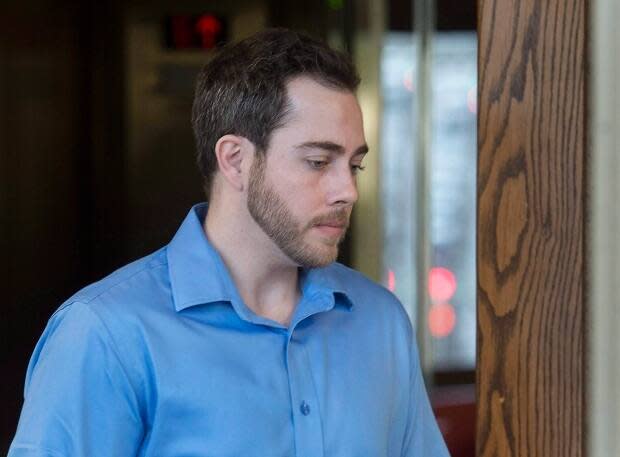Police review board hears closing arguments in Christopher Garnier complaint case

Christopher Garnier had no reasonable expectation of privacy during a visit to his mother's home in February 2017, the Cape Breton Regional Police Service argued in its final submissions Tuesday to the Nova Scotia Police Review Board.
The board is considering a claim from Garnier's family that Cape Breton police officers conducted an illegal arrest and seizure of evidence.
The force submitted written arguments to the three-member panel, which is also reviewing closing arguments from Garnier's father, Vincent Garnier.
He alleges four constables with the Cape Breton Regional Police overstepped their bounds in conducting routine bail checks of his son, who was later convicted of second-degree murder in the death of off-duty police officer Catherine Campbell in December 2017.
Christopher Garnier was arrested Feb. 19, 2017 — about 33 hours after he failed to present himself to police constables at his mother's Millville home.
After he was taken to a central lockup in Sydney, Garnier was driven to the Canso Causeway where he was picked up by Halifax Regional Police officers.
A judge later ruled that Garnier did not intentionally breach his conditions, as he was likely asleep when Cape Breton police came to the door.
'Privileged guest'
Demetri Kachafanas, a lawyer for the Cape Breton Regional Police, argued officers had reasonable and probable grounds to arrest Garnier after he failed to show up at his mother's doorway.
The complaint against the force assumes Garnier had a reasonable expectation of privacy, but Kachafanas described him as "a privileged guest" of his mother's home.
"No evidence was produced to establish that he had any power to regulate or control access to the property," he said.
Vincent Garnier argued against the point, saying his son holds familial and historical rights to the private property.
Photographs of home
He also claimed police overstepped their bounds in taking photographs of ex-wife Kim Edmunds's property without a proper search warrant. He said the photographs were not taken during a compliance check, but after police returned to document which door they had knocked on.
"The surreptitious gathering of evidence, even photographic, to justify the arrest and detention of a person, and risk further incarceration can, and should, never be considered as minor," Vincent Garnier wrote in his closing arguments.
The pictures were used as proof that Cape Breton officers had visited the home to conduct compliance checks. The pictures were then used by Halifax Regional Police to support a case for revoking Christopher's Garnier's bail.

Although it was already established in court that he was home at the time of the compliance check and that police had knocked on the door, his former girlfriend and mother testified that they never heard any knocking.
Vincent Garnier argued police took another misstep in laying charges outside the jurisdiction where the alleged offence took place. He said police did not have informed consent to enter the home to arrest his son. Police have said Edmunds gave them entry by stepping aside and allowing them into her home's landing.
The Cape Breton officers named in the complaint are constables Steve Campbell, Gary Fraser, Dennis McSween and Troy Walker.
A spokesperson for the police review board said a decision will be released soon. The board's decisions are considered final.
MORE TOP STORIES

